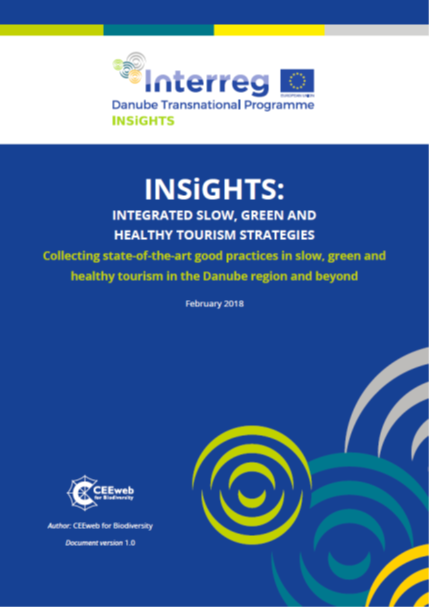INtegrated Slow, Green and Healthy Tourism Strategies

Regions in INSiGHTS all have outstanding natural and cultural resources in need to be protected. At the same time, they have a great potential related to the fast-growing recreational trend of slow, green and healthy tourism, to make them attractive destinations. These features put these regions in a unique position to sustainably utilise their resources. This objective will be supported by the main project outputs which will be generated with an effective stakeholder contribution overarching the whole project lifetime. As main local outcomes, 8 integrated sustainable tourism strategies will be developed by the partner regions on the basis of the common Guidelines which will be adaptable all across the Danube region.
The Comprehensive Model, co-created via a set of innovative exchange sessions, will offer novel solutions along the 3 Thematic Pillars of INSiGHTS, such as (1) integrated tourism management schemes, (2) coordinated tourism supply development linked to greenways, and (3) promotion of healthy & eco-conscious lifestyle. The smart tools and methods will be tested and cross-checked by pairs of partners through pilot actions centred around the key thematic issues. Finally, for maximising the policy impact of the project, Transnational Policy Recommendations will be put on the table of decision-makers.
Thus, the main results of INSiGHTS will be improved participatory governance frameworks tackling responsible green tourism development, being able to support bottom-up networks of tourism providers and generation of quality-driven green tourism packages, which will attract more eco-conscious visitors. Improving the environmental attitude of all players within the complex tourism ecosystem will lead to a better balance between protection and sustainable exploitation of local resources, reduce the ecological footprint of destinations, and also contribute considerably to sustainable socio-economic development for the benefit of local communities.
Background
The regions involved within the project, likewise many similar rural areas in the Danube region, are commonly characterised by undisturbed natural sceneries, rich cultural repertoire and living traditions, therefore represent outstanding potentials for sustainable slow tourism. The ever-rising demand for exploring such unique and intact landscapes for touristic and leisure activities (slow tourism is the fastest-growing segment of the global tourism industry attracting both youth and ageing population) creates an increasing challenge for upgrading the valorisation of the valuable local assets in a way which does not endanger the preservation of the natural quality.
Such territories in the Danube region and within the project reached different stages of sustainable tourism development. Tourism services of the involved regions are typically fragmented without meaningful/ effective coordination, therefore a major challenge lies in the improved collaboration of different stakeholders in the tourism value chain, which requires creating the framework and setting up horizontally and vertically integrated tourism management schemes. Destination management needs to get harmonised with nature and heritage protection aspects which would be an effective tool for ensuring both environmental and economic long-term sustainability for these regions and could support preserving the diversity of the valuable natural and cultural resources in the Danube region.
Capacity development of individual tourism providers is also needed, both in terms of fostering bottom-up partnerships able to coordinate and diversify their offer, as well as by introducing innovative ICT tools, both facilitating the attraction of more visitors and increasing visibility.
Lots of rural regions still face the problem of low environmental awareness amongst a wide range of stakeholders in the tourism sector, which, coupled with the lack of appropriate information on the new demands of the growing slow and eco-tourism segment, does not allow to wisely exploit the valuable potentials of these areas.
Goals & Objectives
Overall objective:
- To foster sustainable utilisation of natural and cultural heritage of the involved areas in the Danube region in order to preserve and upgrade the intact local resources providing an outstanding potential to make these areas attractive destinations for healthy and slow tourism and, thus, serve as the foundation for a flourishing responsible green tourism sector.
Specific objectives:
- Establishing integrated sustainable tourism management schemes
- Promoting coordinated and smart tourism products linked to greenways
- Stimulating eco-conscious and healthy lifestyle through green tourism
Activities
- Development of Integrated Sustainable Tourism Strategy Guidelines
- Organisation of Regional Stakeholder Empowering Workshops
- Development of Integrated Sustainable Tourism Strategies
- Development of a Model on slow, green & healthy tourism development
- Transnational INSiGHTS walkshops
- Transnational policy recommendations
- Pilot actions on integrated tourism management
- Pilot actions on greenway related tourism products
- Pilot actions on promoting green & healthy living
Types of services
- Capacity building
- Building comprehensive know-how and collecting best practices
- Fieldwork
- Pilot program testing
- Communications and awareness-raising campaigns

